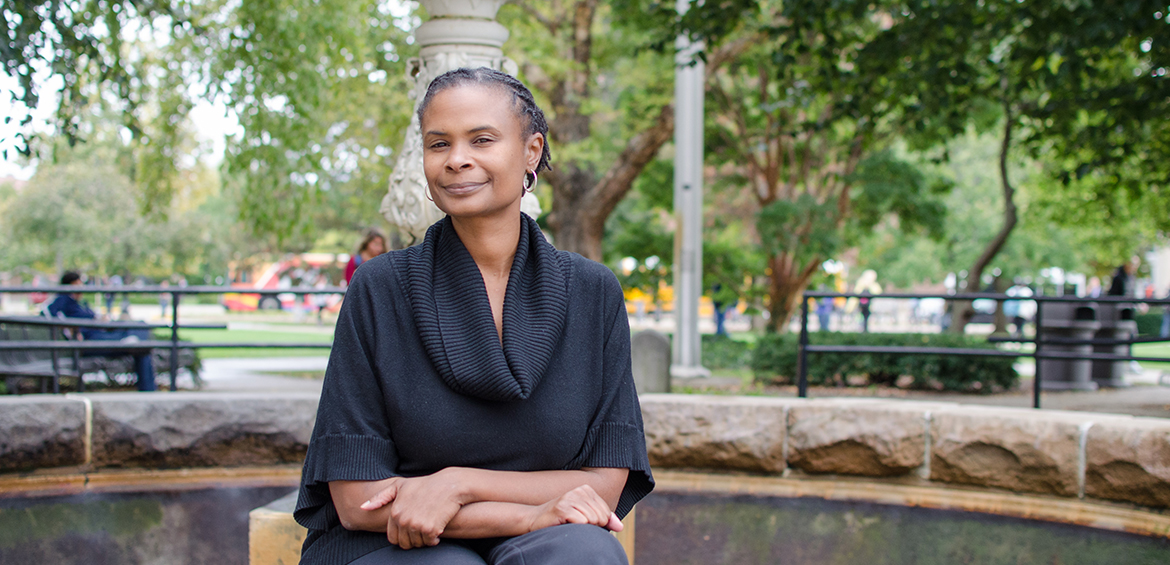New Directions in History
In new speaker series, experts share innovative approaches on history

The way Frederick Rowe Davis sees it, his department’s “New Directions in History” series is valuable on multiple levels.
For starters, it enriches the intellectual conversation at Purdue by bringing innovative historical scholars to campus to share their wealth of knowledge. An added benefit is that it also allows junior faculty members to interact with experts from their various specialties.
“There’s incredibly exciting scholarship in history and I wanted to give the students, faculty, and Purdue community an opportunity to hear leaders in their fields discuss cutting-edge scholarship,” said Davis, head of history, who launched the series during the 2018-19 academic year. “Fortunately in each case, each of the speakers has been vetted by a professor in the department who sees that individual as a leader in their field.”
Colonial and Revolutionary American scholar Virginia DeJohn Anderson from the University of Colorado Boulder visited in February to discuss her book "The Martyr and the Traitor: Nathan Hale, Moses Dunbar, and the Tragedy of the American Revolution" (Oxford University Press, 2017). The COVID-19 outbreak forced the postponement of the second "New Directions in History" lecture of the semester, which was to be delivered on March 12 by Judith Weisenfeld, Agate Brown and George L. Collord Professor of Religion at Princeton University.
Weisenfeld, who was invited to campus by Associate Professor of History Kim Gallon, planned to address 19th century white American psychiatrists’ declarations that “religious excitement” was contributing to mental illness among African Americans in the South that had risen to alarming levels. Weisenfeld's scholarship examines how such psychiatric theories on race, religion, and mental normalcy have impacted the African American experience.
Assistant Professor of History T. Cole Jones, himself a Revolutionary scholar and author of the new book "Captives of Liberty: Prisoners of War and the Politics of Vengeance in the American Revolution" (UPenn Press, 2019), identified Anderson as a series speaker because of her unique approach to the subject matter in her book.
“It was really interesting because it’s a dual biography that took these parallel lives of these two men who didn’t know each other, but who lived in the same colony and whose lives were both destroyed by the American Revolution on opposite sides,” Jones said. “It was just a really innovative approach, I thought, to subjects’ microhistory through biography.”
Jones said he was pleased by the way students engaged with Anderson’s work, substantiating Davis’ primary purpose for creating the series a year ago.
“I think any series that brings in scholars doing exciting new work is going to enliven the intellectual culture of a department and a college like the College of Liberal Arts,” Jones said. “So I think it’s absolutely vital that we continue to bring in people doing cutting-edge work, not only because it puts Purdue on the map because we have a series fostering that type of intellectual exchange, but it also gives us an opportunity to inspire our graduate students and even our undergraduate students.
“You’d be surprised by how many of my undergraduate students came to Professor Anderson’s talk and were deeply engaged. Several of them had already read her book and asked really good, cutting-edge questions. So from a pedagogical standpoint, I think it’s just a spectacular series.”
Secondarily, the series creates a valuable opportunity for the junior faculty members who invite and are able to share ideas with their “New Directions” guests. Jones had met Anderson only briefly before she visited Purdue in February. Assistant professors Margaret Tillman and Silvia Mitchell enjoyed similar opportunities last spring when they hosted historians Peter Perdue (Yale University), Merry Wiesner-Hanks (University of Wisconsin-Milwaukee), and Antonio Feros (University of Pennsylvania) as guests in the series’ inaugural year.
“Part of the ulterior motive is not only for students and faculty of the department and the Purdue community to hear from this person, but also an opportunity for the professor who invited in the speaker to interact with a leader in their field,” Davis said. “There is a networking element, but I think it’s primarily all about scholarship and engagement and trying to show just how dynamic and exciting history is currently.”